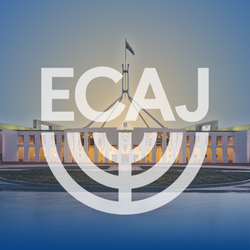This opinion piece by ECAJ co-CEO Peter Wertheim was originally published in the Hobart Mercury on 9 August 2024.
Peter Boyer (‘Proclaiming business as usual is just a state of denial’, Talking Point, August 6) makes a fair point when he observes how self-destructive it can be to wilfully deny reality and refuse to take responsibility for one’s own actions.
He is also wise to acknowledge that most of us have been deniers on occasions when confronted with an awkward reality. His highly selective rendering of the history of the Israel-Palestinian conflict is a case in point. The following are some of the key facts which weren’t included in his piece.
While the Jewish religion, the Land of Israel and Jerusalem (Zion) are intrinsically interconnected, Mr Boyer is wrong to suggest that modern Zionism as a political movement depends on religious claims. Rather, it is based on the collective right of national self-determination of the Jewish people in their historic homeland, Israel, where the Jewish people have had an enduring presence for more than 3000 years, including more than 1000 years of national self-government.
After the destruction of the Jewish commonwealth by the Romans 2000 years ago, the land was ruled by a succession of foreign imperial rulers. Until the restoration of Jewish sovereignty in 1948, the local inhabitants at no time had any form of self-government.
The right of self-determination of peoples, including the Jewish people, has been recognised in resolutions of the United Nations and its predecessor the League of Nations, and is enshrined in the UN Charter, the International Covenant on Civil and Political Rights and the International Covenant on Economic, Social and Cultural Rights.
For the vast majority of Jews, and for many other people, the attempt to deny this basic, universal right to the Jewish people is self-evidently discriminatory against, and dehumanising of, Jews and is therefore a form of anti-Semitism.
Zionism does not necessitate any views about the borders of Israel, settlements, the legal status of Jerusalem or Palestinian statehood. Among Israelis, the Jewish people and others who accept the validity of Zionism there is a wide range of views about these issues.
One can be a Zionist and also believe in the principle of two states for two peoples, meaning that within the territory of the former British Mandate there is room for a Jewish state and a Palestinian Arab state existing side-by-side.
In 1947, the UN General Assembly voted in favour of this two-state principle (Resolution 181), which the Jewish side accepted and the Arab side not only rejected but commenced a war to prevent. It was this war, started by Palestinian and other Arab leaders, that led to the Nakhba – the displacement of 700,000 Palestinian Arabs.
Mr Boyer also omits to mention the simultaneous expulsion of more than 800,000 Jews from their ancient communities in Algeria, Egypt, Iraq, Libya, Morocco, Syria, and Yemen. They were physically persecuted, their property and belongings were confiscated, and they were subjected to severe anti-Jewish riots instigated by the governments of those countries.
It has since come to light that these measures were taken by Arab governments in concert in accordance with a document entitled: “Text of Law Drafted by the Political Committee of the Arab League”. It was affixed to a 19 January 1948, memorandum submitted to the UN Economic and Social Council warning that “all Jews residing in the Near and Middle East face extreme and imminent danger”. This memorandum was summarised in UN Economic and Social Council Document E/710, released by the Committee on Arrangements for Consultation with Non-Governmental Organisations. It provided for depriving Jews in Arab countries of certain citizenship rights and the freezing and expropriation of their bank accounts.
Since then, the conflict has erupted in many forms.
Neighbouring Arab states have tried to eradicate Israel through conventional warfare (in 1948 and 1967), terrorism, economic boycotts, lawfare and campaigns of demonisation.
Despite this, Israel has made at least three offers to the Palestinians which would have resulted in the establishment of a Palestinian state covering the whole of the Gaza Strip and an area equal in size to the West Bank, together with a capital in east Jerusalem. The offers have gone begging because Palestinian leaders remain in denial about Israel’s existence and its right to exist.
The rejection of the two-state principle and of the Jewish people’s collective right of self-determination, within any borders, persists within the ideology of Hamas and other terrorist groups to this day and helped motivate the attacks they carried out and the atrocities they committed in Israel on October 7, 2023.
Deny it or not, this rejectionist posture remains the basic driver of the conflict.






